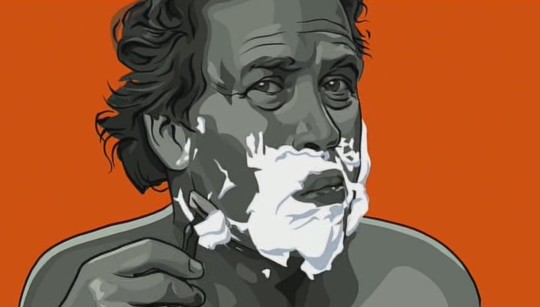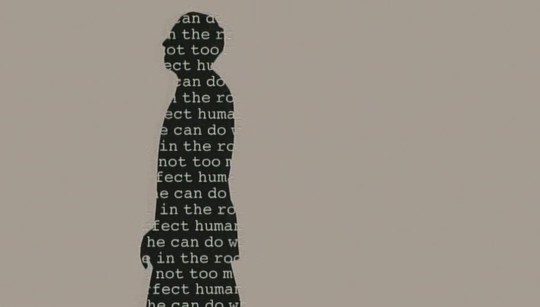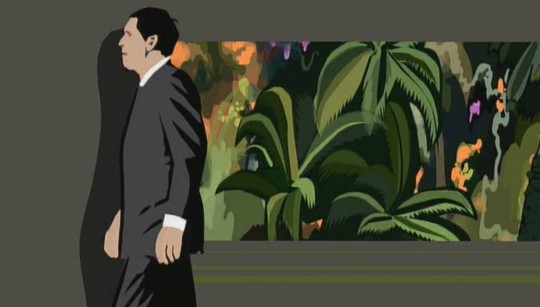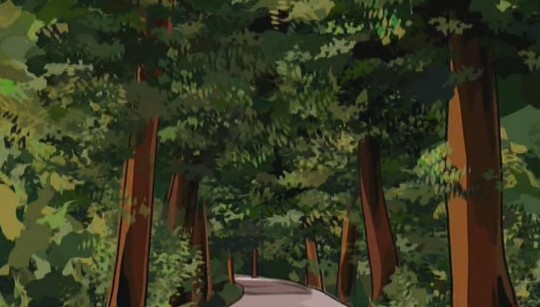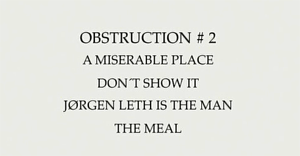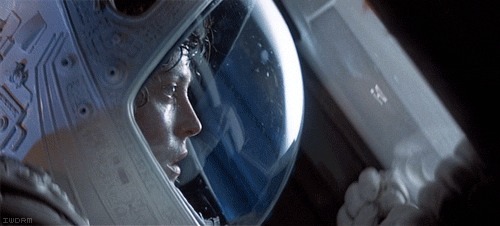Text
The Boss of it All ~ Lars Von Trier
Lars von Trier’s ‘The Boss of It All’ (2006) is a situational comedy in which a character by the name of Ravn attempts to get out of the large hole he has dug himself into. Ravn owns an IT company but, being afraid of confrontation and delivering bad news, he created an all-powerful CEO to hide behind, making this imaginary figure a scapegoat for the employees to vent their anger towards. Eventually Ravn decides to sell the company, but massive problems arise -- for the prospective buyers insist on only negotiating with the CEO, in person. Ravn counteracts this by hiring an out of work actor (Kristoffer) to play ‘the boss of it all’ in order to close the deal, but first Kristoffer is put through his paces with the employees. This amount of improvisation from Kristoffer promises much laughter from the audience and does not disappoint. “The Boss of it All” is extremely uncomfortable, even more so through the in camera editing technique that Lars Von Trier uses, a means of filmmaking called Automavision. Automavision is where filming is done with an "automatic randomized camera" that randomly selects the shots, resulting in a very haphazard collection of shots, with continuity far from continuous and framing all askew, further enhancing the clumsiness of the scenes. Long, gaping, silences from Kristoffer while he attempts to improvise his lines are responded with loud, angry outbursts from staff members, venting their pent up fury. The film is full of hilarious emotion and a raw humour.
0 notes
Photo



yorshire:
DON’T DELETE ANY TEXT PLEASE AND THANK YOU
Okay so my friend’s were giving away a bunch of their stuff because they’re updating to newer (word??? who knows) stuff and so they gave a lot of it to me bc yeah and I ended up with a lot of doubles so I thought “What a perfect time for a giveaway!” and this is my outcome
R U L E S:
-MUST be following me
-MUST rebog this post
-PLEASE don’t be another giveaway blog, I really want this stuff to go to someone who really wants it (and will use it) :)
-YOU can like to bookmark
-REBLOG as many times as you want, though it’ll help your chances to reblog multiple times
that’s it yo
PRIZES (yay!!)
-(white) iphone 5
-IPad mini
-set of books (Hunger Games complete series, Paper Towns, Divergent [not pictured: The Fault in Our Stars, Insurgent: Sequel to Divergent])
-Iphone 4+case
Ipod (shuffle?? its gold lol) with three cases and ear phones
-macbook pro
-Nikon D90 (perfect condition)
-Brown Leather Jacket from Le Château size M
NOTE: I ship anywhere and everywhere :) GIVEAWAY SHOULD END AROUND DECEMBER 29TH
so yeah get rebloggin’ homies :)
171K notes
·
View notes
Text
'Ten' (2002) by Abbas Kiarostami
Abbas Kiarostami’s docufiction film ‘Ten’ is a conversation about Iranian values and Muslim culture in regards to woman’s rights and treatment in that society. The film is comprised of two camera angles inside the protagonist’s car, one pointing at the driver’s seat and one at the passenger seat. Mania Akbari, the driver, travels around giving lifts to a mixture of family, friends and strangers. The film is exclusively made up of her conversations with those passengers. While not having any kind of straightforward narrative, or a plot at all, ‘Ten’ does have a certain depth to it that you would not believe possible using only two camera angles and one location. The depth derives from the realness that ‘Ten’ is comprised of, convincing and lifelike discussions, a lot of which were improvised or simply taken from real life. This was the case with the scenes involving Amin, Mania’s real son, as they discussed the divorce of Mania and Amin’s father, which happened in real life. The raw emotion that is uncovered in this scene set the mood for the rest of the film, one of real issues and real passion. It is obvious that many of these characters have strong opinions about how woman are perceived and treated in Iran. There is a palpable lack of variety in location, camera angle, shots, and just about everything in the film. This could definitely induce yawns amongst the disinterested, or to those who need a narrative storyline to keep themselves going (most movie goes fall into this category). Though there is a lot of real, raw emotion surrounding very interesting and on point discussions, it is not for everyone, and is mostly, after all, a series of chats in a car.
1 note
·
View note
Text
'The Five Obstructions' review
Lars Von Trier and Jorgen Leth, two talented directors, made a documentary film in 2003 with themselves as the subjects. The film documents Jorgen’s attempts at recreating his 1967 film ‘Det perfekte menneske’/ ‘A Perfect Man’ with certain obstructions put in place by his friend Lars Von Trier. These obstructions ranged from having shots no longer than 12 frames to making the film in cartoon form. No obstruction was to great for Leth and he triumphed over them all, creating great films in the process, proving that constrictions can sometimes be strangely freeing.
The relationship between Trier and Leth was captured during this process. Their communication with one another was critical, frank and even callous at times, but nothing they said had any negative impact on their relationship, it is evident that it is one of profound respect and mutual admiration. In saying that, it was also obvious that Trier was trying desperately to see his mentor fail in one way or another, he wanted so badly for Leth to make a ‘crap film’. Whether this was because he wanted Jorgen’s experience to be therapeutic, as he said, to help cure him of his perfectionism, or maybe just to feel better about himself as a director, I don’t know. Either way he didn’t seem very happy when Leth overcame each obstacle, perhaps not with ease, but with a grin on his face.
Parts of this documentary I want to fast forward, but the pay off of each film variation was worth it.
0 notes
Text
Alien 1979 review
Alien, a 1979 sci-fi, horror thriller combo directed by Ridley Scott. The crew aboard the space vessel Nostromo receive a distress call from an extra terrestrial planet; after searching the planet they head home only to realise that a dangerous alien life form has joined them on the ship.
The storyline is one that has been done before, the outline of finding a foreign extra terrestrial, bringing it back, organism killing off the humans one by one has been done a couple of times before Alien had a go at it (think Howard Hawkes “The Thing From Outer Space” in 1951). Alien did it in a much more futuristic, scientific manner, using scientists and engineers rather than the average horror film characters (rambunctious teens and clueless adults).
Today’s thrillers are too much about the payoff and not enough about the lead up. Alien is a great example of the importance of suspense in thriller/horror films. They used a very clever technique to keep the curiosity and suspense alive, they made the alien evolve/change its appearance so that the audience never knew exactly what they were going to see. Far more than just suspense, Alien also exaggerates the gross factor that often come with science fiction flicks; the slimy acidic goo that excretes from the alien, the pus like liquid that drips from the robot-man and the saliva that surround the mouth of the evolved alien are all used to make the audience feel uncomfortable and disgusted, adding to the already thick layer of emotions that come from watching this film.
The soundtrack was another thing that made this film unique for its time. It wasn’t overdone, with loud violins screeching every chance they get. The film was often quiet but barely silent, the ship was always full of the sounds of its functioning, beeps and rings and rushes of steam etc. The constant sound made the time when it was very silent even more effective.
Alien launched Sigourney Weavers career and made her the female face of sci-fi thrillers for a time after that, and rightly so, she was so fucking bad-ass in this movie.
3 notes
·
View notes
Text
Gerry 2002 ~ Gus Van Sant
Gus Van Sant’s film ‘Gerry’ follows the fates of two friends, young men each named Gerry, after they embark on a hiking trip and end up desperately lost in the desert. This frustratingly minimalistic story is told with little emotion and even less dialogue, even those few loose phrases coming off as vague and often times nonsensical.
The performance of Matt Damon and Casey Affleck were intentionally (I think) sparse, not giving away much emotion at all, as though they were kind of blasé about their potential, if not likely, death. It was not until the end, when Affleck broke down in tears, that we managed to see any passion in the performance. Why Gus decided on this aesthetic I’m not entirely sure, with the extremely bare content of the film I would imagine he would want as much feeling in the performance as possible, if only to make the film more tolerable to watch.
The cinematography was, in my opinion, much more commendable. Dreamlike sped-up clouds and shadows paired with a deliberate discontinuity gave the film a surreal feeling, as though through the minds of the severely dehydrated couple. The constant and sudden changes in weather accentuated the passing of time as well as signifying the uncertainty of their journey’s outcome. The camera’s slow 360-degree turn around Gerry evokes the feeling of dread, as the audience sees nothing for miles around, an agoraphobic’s nightmare.
The tragic ending is admittedly the only part that stirred any emotional response from me, other than irritation that is. The fact that Gerry died so very close to the highway and civilization was absolutely shattering. The psychological effect that this would have on the surviving Gerry would be immense, and that was the only part that made me really think. Maybe there is some underlying, existential meaning, but underneath what? The content was so unembellished that I don’t think there was anywhere for existential undertones to hide. Needless to say I didn’t really enjoy this film, and may have been reading a George R. R. Martin book in the background, one page of which had more story than the entire film ‘Gerry’.
1 note
·
View note
Photo
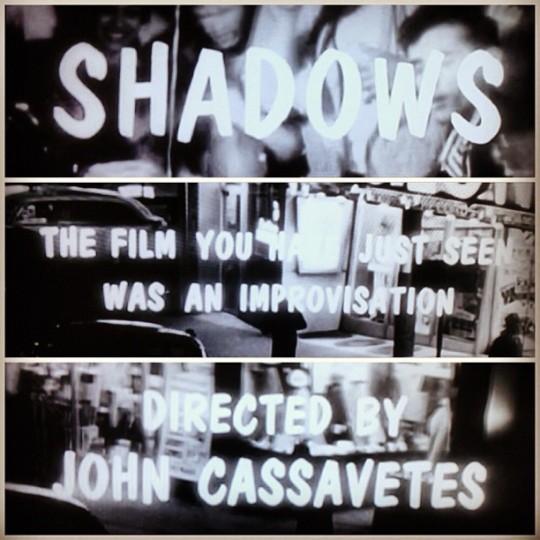
lo primero del padre del cine independiente #Cassavetes #Shadows
1 note
·
View note
Text
'Shadows' ~John Cassavetes
John Cassavetes’ ‘Shadows’ is a largely improvised film set in the beat era, New York City. The film on the surface is about the exploration of inter-racial relationships at this time. Most reviews of ‘Shadows’ refer to the topic of race as being the main theme of the film, but Cassavetes disagrees “we did not mean it to be a film about race…we're not politicians… we're not pushing anything. I don't believe the purpose of art is propagandizing”-Cassavetes.
In the book “Cassavetes on Cassavetes”, a series of interviews edited by Ray Carney, Cassavetes admits that he has always thought of the film as very personal. Almost all of the scenes were based on his own experiences and feelings. Ben's aimless alienation and cruising for girls, Lelia's romantic impulsiveness, Rupert's and Hugh's belief that friendship was more important than business, and Tom's tirade about colleges and professors all embodied aspects of his feelings and beliefs.
‘Shadows’ was on of Cassavetes’ early films, which is evident when you hear about the disastrous production period that his actors and crew had to endure. His inexperience caused a mass walk out of ‘Shadows’ first screening, and in turn a re-shoot that made the overall production period about 3 years. Despite this, ‘Shadows’ and Cassavetes’ later work made him a memorable director that many later directors (eg Tarantino and Scorsese) took inspiration from.
Cassavetes always wanted to capture the actors spontaneity and true emotions, often leaving the camera rolling for far too long and not allowing rehearsal for camera (much to the chagrin of his DOP). The film reflects Cassavetes’ desire for the return of realism, he believed that we have lost the art of true human emotion, hiding behind facades of falseness, restricting ourselves emotionally. When asked what shadows was about he said “masks and faces”. There is a moment after Lelia is in bed with a man after having sex and she in no way hides her disappointment in the act or her curiosity as to what happens next. She is not self conscious of what her partner thinks of her emotions, she just openly feels.
I enjoyed the rawness of this film, but got a shock when it ended so suddenly. Was is meant to be so inconclusive or was this just another of Cassavetes’ blunders?
1 note
·
View note
Photo
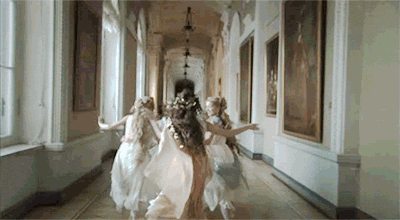
Russian Ark is a 96 minute Russian film that was shot in one take.
Russian Ark is a 2002 historical drama film directed by Alexander Sokurov. It was filmed entirely…
View Post
11 notes
·
View notes
Text
Russian Ark ~ Aleksandr Sokurov.
An unseen man, the eye through which we experience the film, regains consciousness in an unknown location where no one seems to be able to notice him except for a man in black. Together they discover that they are in the Hermitage in St. Petersburg. The two journey through the palace together, recounting the history and art of various eras of Russian history.
The most obvious aspect of this film that sets it apart from most others is that it is all filmed in one continuous shot. This lack of cuts means that an amazing amount of choreography and planning would have had to go into the film. The camera moves with the unseen man in a floating manner, not quite the regular '1st person shot' because we do not see his hands or legs at any point in time, almost as if the purpose is for us to put ourselves in the position of narrator.
Personally I thought the film had a great starting concept but it could have been further fulfilled. The whole idea and beginning of the film was brimming with possibility and potential. An unknown man gains consciousness in an unknown location, somehow transported through time, we begin our journey throughout this decedent palace, we could be going anywhere and meeting anyone, but the reality falls a little flat. Instead of extraordinary scenes depicting events in russian history, we mostly get snippets of chit chat between the european and various art lovers along with a couple of "get out!"s. Though we do get a glimpse into the lives of some historical figures (such as Anastasia and Catherine the II) and events (WWII) we don't really explore them, much like walking down the hall at an art gallery and only quickly glancing at the artwork.
The film had a very meaningful and nostalgic tone and I don't think I minded that it was bereft of all cuts, but I honestly believe it was a little dull, sorry Vince.
0 notes
Text
Inland Empire review
I have had only a small amount of previous experience with David Lynch's films, but I have to say, this film makes Mulholland Drive seems like an easy to follow film for the whole family.
This was frustrating to say the least. The very loose narrative is based on an actress, Nikki, who has just landed a starring role in an upcoming film. The film is based on an old Polish script that has a history, apparently cursed. Two previous leads were murdered during production, causing the film to never be released. Nikki realises that her life is beginning to mimic the fictional tale of the film. She delves in and out of reality, not knowing if she is Nikki or Susan (her character).
David Lynch is not afraid to paint an ugly, grotesque picture with his films, this being no exception, if not the embodiment. I finished this film feeling eerily disturbed and intellectually violated, kinda like being hit on by a really old guy with no teeth whilst he dances the cancan unblinkingly. The structure was non-linear, naturally, riddled with symbolism that no-one can understand (nor will Davo ever tell us) and utterly, earth shatteringly confusing. At least when you see an abstract theatre piece you can usually find meaning in the seemingly meaningless ramblings, like, okay she is hitting the pocket watch with a hammer, must symbolise her desire to stop time right? But not so with Davo, no way, nothing is as it seems and nothing is certain.
One positive thing I can say for the guy is he must be one hell of a director because those actors are really put through their paces as far as character development goes. The abundance of close ups means that the actors have to be right on the money as far as showing subtlety in their emotions in order to further the characters depth.
Lynch also has a strong sense of style in his cinematography. He chose to use digital footage, purposely un-aesthetically pleasing, to make the film seem even more ugly.
Lynch does a lot of artsy shit that make amazing films that are obscure, meaningful, symbolic and abstract, but if we were to define a 'good film' by, say, entertainment value and enjoyment, then Inland Empire wouldn't make the cut, I want my 3 hours back.
2 notes
·
View notes
Photo
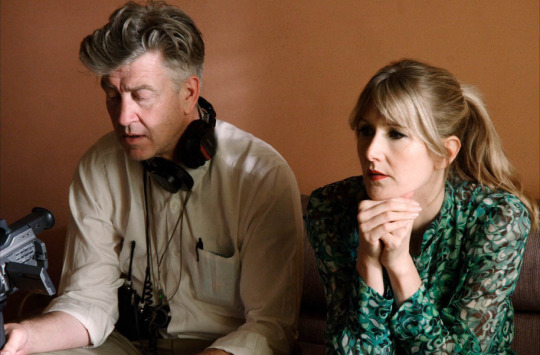
David Lynch and Laura Dern o-set of Inland Empire (2006)
360 notes
·
View notes
